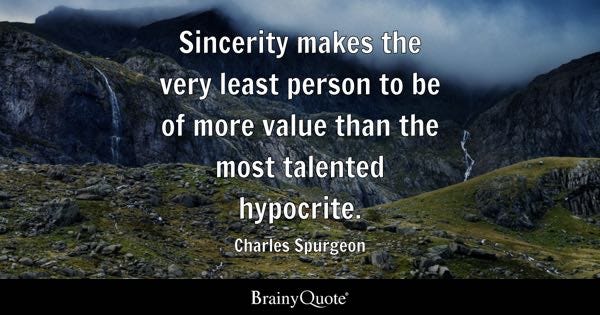Sincerity Isn’t Sexy—But It’s Exactly What Politics Needs
Politicians and Citizens, often silent, are free to be sincere, especially about the good stuff
Sincerely,
John Wesley
I never write that. It doesn’t fit. Maybe my writing is just too odd and silly to end with some claim to sincerity. Maybe I just haven’t found the courage.
But as elections are coming up at all three levels of government and regular people are having more contact with politicians and would-be politicians than they normally would, sincerity is a trending topic of conversation. Good, I think. Because it’s important.
Once at a political rally with Emily when she was a teen, the candidate kept talking about how passionate they were about this and that. Emily leaned over and sniped, “Saying you’re passionate is like saying you are cool – if you say it, it seems like you’re not.”
Maybe it’s like that for me with sincerity itself. I worry that sincerity is not cool.
There’s an old joke in politics that sincerity is the most important thing… and once you can fake that you’ve got it made.
Real sincerity, I suppose, represents a strict concordance between what you say and what you actually feel and believe. By that definition, I guess I’m painfully sincere.
In practice, sincerity is about aligning your words, actions, and feelings without the veil of pretense, manipulation, or strategic softening. It’s not that everything you say is right or unchanging. It’s not that every forward-looking statement you make will come to pass. It's being honest not just with others but also with yourself—expressing genuine feelings and beliefs, whether in casual conversation, business, or more intimate exchanges.
Sincerity is not private. It’s about others. It’s about intentions. While similar to honesty or authenticity, it’s more heartfelt and good. One can be honest and not sincere*.
Sincerity vs. Authenticity
One thing that has come up in modern politics is a schism between sincerity, which is about communication, and authenticity, which is about the self. People often say, “I like authentic people.” That’s true until they meet an authenticity they don’t like. No doubt though, they don’t admit it. They just say the person is not authentic. In the modern world, authenticity is more like a brand that justifies being an ass - it’s often isolating and self-centred. Sincerity, thankfully, is still about communicating and being part of something larger.
In relationships, communities, and politics, this distinction matters. Sincerity is collaborative, authenticity as it's often expressed today is competitive. Sincerity seeks common ground and mutual respect, while modern authenticity, taken to its extreme, can become about asserting the self above all else—sometimes at the expense of those around you.
However, in most situations, sincerity often gets diluted. People tend to dial back their true thoughts or embellish them to fit social norms, avoid conflict, or gain favor. Compliments may be given to maintain harmony, not because they’re truly felt. Criticism is softened with a "no offense" to dodge backlash, and genuine emotions get disguised in humor to protect against vulnerability.
On Political Debate
In debate politicians, taking on a team sport style roar at each other in a way that’s painfully insincere and heart-sinking to watch. Citizens and politicians often focus on differences, conflicts, and what’s wrong, leaving the "good stuff" and their own humanity largely unsaid or overlooked. Yet, the things we share—values, hopes, achievements—are powerful and far more common than our differences. They remind us that, beneath the noise, there’s common ground worth celebrating.
Social dynamics often reward small acts of insincerity, like playing along with the mood of the room or keeping things light to avoid discomfort. In everyday interactions, it's not uncommon for people to say what they think others want to hear or to downplay real emotions in favor of maintaining appearances.
On flattery
It sure works on me. If someone says they like my shirt or any such thing I don’t even spend a second wondering about their sincerity. It makes me feel great and a match for the world. But, if it goes on at any length, if it’s revealed as a pattern, it’s awful. It’s cloying and phony at best and unhealthy or nefarious at worst. It takes me a while, because I’m always thinking everyone is awesome, but sometimes you can see a pattern of insincerity. I think it’s pretty rare though and often practiced so sloppily that it’s obvious.
More often it’s just really disarmingly open people saying what they think. My mom often complimented people on little things. Once I noticed it, I came to see that what she was doing was just letting herself go. Just saying the thing that popped into her head. She never calculated it and she never gushed. Just, “I like that…” “That was a good…” “You really…” and then just moved on. It is kind of freeing I think to at least let the good thoughts out.
The Insincerity of Silence
In this sense silence – from the citizen, the politician, or the government - can be the most insincere thing of all.
John Ralston Saul, one of Canada’s great provocateurs of political philosophy took it to extremes:
The citizen's job is to be rude - to pierce the comfort of professional intercourse by boorish expressions of doubt.
John Ralston Saul
It's about expressing what’s true, even when it might not be convenient or socially expected. So, while people admire and crave sincerity, it’s often under-practiced because it can disrupt the smooth flow of everyday social interactions.
On Openness
Keeping the good stuff to yourself is a form of insincerity that is arguably even more common than fake flattery. We pretend our feelings are less strong than they actually are: we reveal deeply-held dreams and beliefs with self-deprecation; disguise the heartfelt intent with jokey patter; cloak a genuine opinion in sarcasm; follow a confession of delight with an ironic wink and nod.
It takes a certain amount of courage to offer one’s feelings directly; to risk criticism, embarrassment, and rejection. It’s a rite of manhood to passage into the custom of shaking hands with other men friends and people you meet. Handshakes can be more expressive than words and just as susceptible to insincerity. It takes years to learn to get it right in every situation – partly because it’s a kind of dance where both are communicating at the same time.
It wasn’t until I was close to 30 and in business that I actually heard another man say what he thought of me sincerely. It’s a memorable thing. Once in a particularly heated week during the John Savage government while I was pounding away at getting the Film Tax Credit drafted a man in the premier’s office… well, I’ll name names… Roydon Trainor… who I had come to know well, said, kind of out of nowhere in my mind, “I consider you a friend”. Like right to my face. Sincerely. Never before and seldom since have I stood so clear in where I stood. Likewise, when an old NFB producer… Kent Martin… was not happy with a story cut I had delivered he asked me into his office, closed the door, and said, “John Wesley, I’m feeling cross with you, because of the tone you took with this story.” It’s just great to know where you stand. Sincerity a great gift. It gives you something to work with.
It takes a certain amount of courage to say, “I really like you,” or “I feel cross with you,” without preparing, based on the response, to jump through a “Just kidding!” escape hatch or allowing “everyone has their truth” sort of excuses.
On Supporting Candidates
I know people worry about what the neighbours think. But as Johnathan Richmond sang. We can’t let the neighbours, or more precisely fear of the neighbours thoughts, run our lives. That’s caveman brain stuff that needs to be well-managed.
As the elections and politicians come round it is absolutely okay to say you support a political candidate, whether directly to the candidate or to others. In fact, openly expressing your support is a key part of democratic engagement and good citizenship. When you sincerely endorse a candidate, you're participating in the political process, helping to shape public discourse, and encouraging others to think about the issues at stake.
Public endorsements, shared sincerely, allow people to share their values, advocate for policies they believe in, and contribute to the health of a democracy by fostering debate and discussion. It's also a way to hold candidates accountable, showing them that their platforms resonate with voters.
That said, it’s important to remain respectful of differing opinions, as fostering constructive conversations—especially with those who disagree—is another mark of good citizenship.
Sincere Courage
It takes courage and care to be true to yourself, and less false to others while keeping passions within due bounds of convivial conversation; to not only write “Sincerely” on emails, but to make it the bottom line of everything you do and say.
PS* - How could someone be honest but not sincere?
Someone can be honest without being sincere when they tell the truth, but do so without genuine care, empathy, or connection to the person they’re speaking to. Honesty is simply the act of telling the truth, but sincerity requires intention—wanting to be understood, respected, and considerate in how that truth is conveyed.
Criticism, especially in politics is often honest but insincere. The opposition MP who shouts down a government policy may honestly believe it’s bad. But they’re not being sincere if their goal is to criticize rather than help improve. They’re truthful, but not invested in how that truth affects the listener. Their honesty lacks warmth, respect, and a sense of goodwill or purpose.







